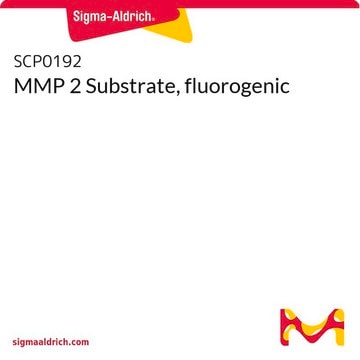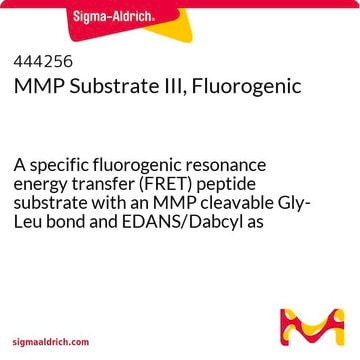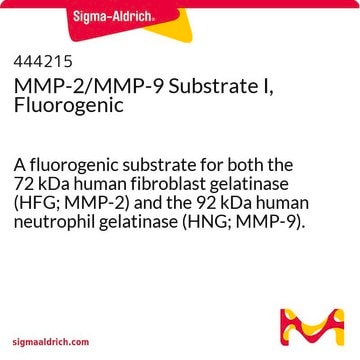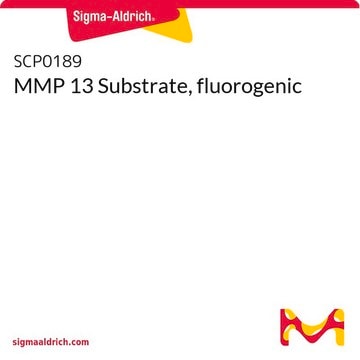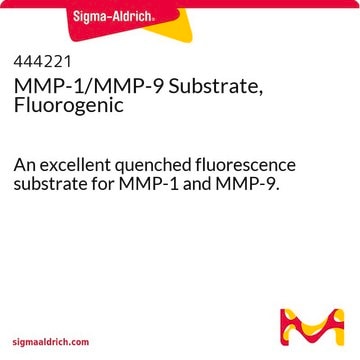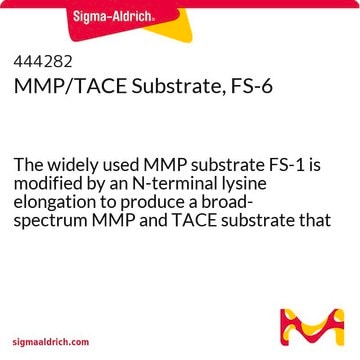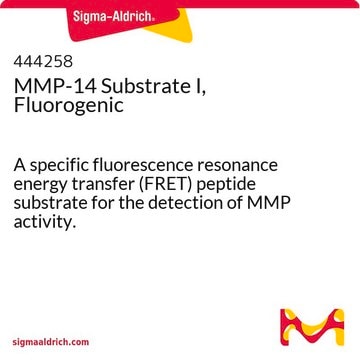SCP0193
MMP Substrate
≥95% (HPLC), lyophilized
Sinonimo/i:
FS-6
Autenticatiper visualizzare i prezzi riservati alla tua organizzazione & contrattuali
About This Item
Formula empirica (notazione di Hill):
C55H80N16O16
Peso molecolare:
1221.32
Codice UNSPSC:
12352200
NACRES:
NA.32
Prodotti consigliati
product name
MMP Substrate,
Saggio
≥95% (HPLC)
Forma fisica
lyophilized
Composizione
Peptide Content, ≥75%
Condizioni di stoccaggio
protect from light
Temperatura di conservazione
−20°C
Amino Acid Sequence
MCA-Lys-Pro-Leu-Gly-Leu-DNP-Dpa-Ala-Arg-NH2
Descrizione generale
Matrix Metalloproteases (MMPs) belongs to the zinc metalloprotease family M10. They are zinc-dependent, calcium-containing hydrolases.
Azioni biochim/fisiol
Matrix Metalloproteases (MMPs) are involved in extracellular matrix (ECM) degradation. MMPs regulate cellular and disease processes. They are implicated in processes such as cell proliferation, migration, differentiation, angiogenesis, anti-inflammatory response, vasoconstriction, apoptosis and host defense. Dysregulation of MMP is associated with arthritis, ulcers, encephalomyelitis and cancer.
The peptide MCA-Lys-Pro-Leu-Gly-Leu-DNP-Dpa-Ala-Arg-NH2, or FS-6, is a fluorogenic substrate for several matrix metalloproteinases (MMPs). FS-6 is a water-soluble, modified form of the well-established MMP substrate FS-1, where a lysine residue has been added to the N-terminus of FS-1. The resulting FS-6 has been reported to give a peptide with improved kinetic properties for several MMPs, including MMP-1, MMP-8, MMP-13, and MMP-14, compared to FS-1. This MMP substrate has also been described as a particularly useful substrate for the zinc metalloproteinase tumor necrosis factor-α converting enzyme (TACE or ADAM-17). FS-6 can be used to measure metalloproteinase activity in tissue culture conditions, for example, on the surface of viable cells in situ.
Codice della classe di stoccaggio
11 - Combustible Solids
Classe di pericolosità dell'acqua (WGK)
WGK 3
Punto d’infiammabilità (°F)
Not applicable
Punto d’infiammabilità (°C)
Not applicable
Certificati d'analisi (COA)
Cerca il Certificati d'analisi (COA) digitando il numero di lotto/batch corrispondente. I numeri di lotto o di batch sono stampati sull'etichetta dei prodotti dopo la parola ‘Lotto’ o ‘Batch’.
Possiedi già questo prodotto?
I documenti relativi ai prodotti acquistati recentemente sono disponibili nell’Archivio dei documenti.
I clienti hanno visto anche
Ulf Neumann et al.
Analytical biochemistry, 328(2), 166-173 (2004-04-29)
Matrix metalloproteinases (MMPs) and the related tumor necrosis factor converting enzyme (TACE) are involved in tissue remodeling, cell migration, and processing of signaling molecules, such as cytokines and adhesion molecules. Fluorescence-quenched peptide substrates have been widely used to quantitate the
Knowledge-transfer learning for prediction of matrix metalloprotease substrate-cleavage sites
Wang Y, et al.
Scientific Reports, 7(1), 5755-5755 (2017)
MMP-12 catalytic domain recognizes triple helical peptide models of collagen V with exosites and high activity.
Bhaskaran R
The Journal of Biological Chemistry, 283(31), 21779-21788 (2008)
Hideaki Nagase et al.
Cardiovascular research, 69(3), 562-573 (2006-01-13)
Matrix metalloproteinases (MMPs), also called matrixins, function in the extracellular environment of cells and degrade both matrix and non-matrix proteins. They play central roles in morphogenesis, wound healing, tissue repair and remodelling in response to injury, e.g. after myocardial infarction
David J Wilkinson et al.
The FEBS journal (2021-07-17)
Matrix metalloproteinase-13 (MMP-13) is a uniquely important collagenase that promotes the irreversible destruction of cartilage collagen in osteoarthritis (OA). Collagenase activation is a key control point for cartilage breakdown to occur, yet our understanding of the proteinases involved in this
Il team dei nostri ricercatori vanta grande esperienza in tutte le aree della ricerca quali Life Science, scienza dei materiali, sintesi chimica, cromatografia, discipline analitiche, ecc..
Contatta l'Assistenza Tecnica.